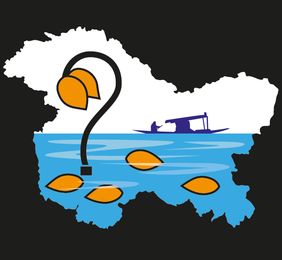Union Home Minister Amit Shah claims “there is no greater testament to the removal of Article 370” than the high polling percentages in the Kashmir valley. Then why is the BJP not contesting any of the three seats in the valley?
The fact is that the reading down of Article 370—the principal boast of the BJP—is the key issue in all three constituencies where the main contenders—the National Conference (NC) of the Abdullahs and the People’s Democratic Party (PDP) of the Muftis—are fighting it out. Article 370 is seen as the symbol of the “identity“ and “dignity” of the Valley inhabitants, as the feisty daughter of Mehbooba, Iltija, who is making her political debut, keeps emphasising. It is also seen as the guarantor of the “rights” of the Kashmiri people. Most importantly, it is seen by Kashmir’s mainstream nationalist parties as their principal shield against the separatists. The National Conference’s candidate for Srinagar, Aga Ruhullah Mehdi, a prominent Shia cleric, affirms, “For us… Article 370 was a pro-mainstream and pro-democracy argument.” That is why all candidates of the principal parties contesting, irrespective of their other differences, are committed to advocating the restoration of Article 370, however hollowed out it had become. But the BJP, for all the empty boasts of the lieutenant governor, the home minister, and the prime minister about “restoring normalcy” by diminishing insurgency and street protests, bringing in lakhs of tourists, and undertaking massive infrastructure works, is hiding behind the skirts of their “proxies”: Sajjad Lone’s People’s Conference, Altaf Bukhari’s Apni Party, and Ghulam Nabi Azad’s Democratic Progressive Azad Party, at least the latter two of which are set to lose their deposits.
The problem with the BJP is that it does not understand at all the psyche of the people of Kashmir and Ladakh and not even of the people of Jammu. Their focus is on hindutva and what they choose to call “development”, but they do not recognise that “man does not live by bread alone”.
In any case, long before the outrage on August 5, 2019, J&K was far ahead of most states, especially the bastions of the BJP—Uttar Pradesh and Madhya Pradesh—on every indicator of economic and human development (such as education and health), and Central budgetary support to the state. Such largesse had not “bought” the Kashmiris either before 2019 or after, because while they are all, of course, seeking peace and personal security and getting better-off, like human beings everywhere, they also seek, like human beings everywhere, honour and respect, and value above all else their “identity”, “dignity” and “rights”. Instead of bringing balm to such wounds, the BJP has turned J&K into “an open-air prison” to instill an atmosphere of fear.
.They have also resorted to the colonial practice of “divide and rule”, most nakedly evidenced in their delimitation commission irrationally joining Anantnag, the fortress of the Mufti family, to Poonch-Rajouri in Jammu over the formidable Pir Panjal range. In my view, this violates the principle of “geographic continuity” which is enshrined in clause 3 of the Delimitation Act. But, worse, the BJP have “deepened the ethnic divide” of Pahari from Gujjar and Bakerwal by granting Paharis ST status on the very eve of the election in the face of strident Gujjar-Bakerwal protests. The National Conference have retaliated by naming Mian Altaf Ahmed, a spiritual leader revered by the Gujjars, who has thrice been an MLA and whose father and grandfather have both been elected to the state assembly, as the candidate to oppose Mehbooba. She has deplored such “peer-mureed” politics, but can she successfully oppose it?
Again, the BJP is nowhere in the picture, the final proof of their politics in J&K over Article 370 having failed.


